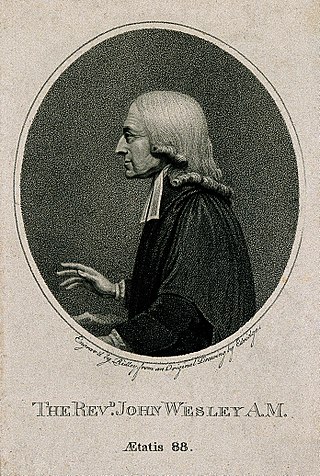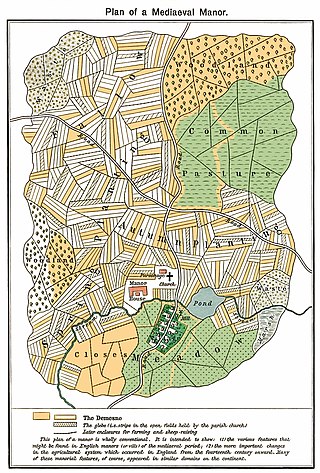
A parish is a territorial entity in many Christian denominations, constituting a division within a diocese. A parish is under the pastoral care and clerical jurisdiction of a priest, often termed a parish priest, who might be assisted by one or more curates, and who operates from a parish church. Historically, a parish often covered the same geographical area as a manor. Its association with the parish church remains paramount.

In church governance, a diocese or bishopric is the ecclesiastical district under the jurisdiction of a bishop.

A deacon is a member of the diaconate, an office in Christian churches that is generally associated with service of some kind, but which varies among theological and denominational traditions. Major Christian churches, such as the Catholic Church, the Oriental Orthodox Churches, the Eastern Orthodox Church, Lutheranism, Methodism, Anglicanism, and The Church of Jesus Christ of Latter-day Saints view the diaconate as an order of ministry.
Presbyterianpolity is a method of church governance typified by the rule of assemblies of presbyters, or elders. Each local church is governed by a body of elected elders usually called the session or consistory, though other terms, such as church board, may apply. Groups of local churches are governed by a higher assembly of elders known as the presbytery or classis; presbyteries can be grouped into a synod, and presbyteries and synods nationwide often join together in a general assembly. Responsibility for conduct of church services is reserved to an ordained minister or pastor known as a teaching elder, or a minister of the word and sacrament.

The Reverend is an honorific style given before the names of certain Christian clergy and ministers. There are sometimes differences in the way the style is used in different countries and church traditions. The Reverend is correctly called a style, but is sometimes referred to as a title, form of address, or title of respect. The style is also sometimes used by leaders in other religions such as Judaism and Buddhism.
A pastor is the leader of a Christian congregation who also gives advice and counsel to people from the community or congregation. In Lutheranism, Catholicism, Eastern Orthodoxy, Oriental Orthodoxy and Anglicanism, pastors are always ordained. In Methodism, pastors may be either licensed or ordained.
In religious organizations, the laity consists of all members who are not part of the clergy, usually including any non-ordained members of religious orders, e.g. a nun or a lay brother.

Glebe is an area of land within an ecclesiastical parish used to support a parish priest. The land may be owned by the church, or its profits may be reserved to the church.

A clergy house is the residence, or former residence, of one or more priests or ministers of religion. Residences of this type can have a variety of names, such as manse, parsonage, rectory or vicarage.

In Christianity, a minister is a person authorised by a church or other religious organization to perform functions such as teaching of beliefs; leading services such as weddings, baptisms or funerals; or otherwise providing spiritual guidance to the community. The term is taken from Latin minister. In some church traditions the term is usually used for people who have been ordained, but in other traditions it can also be used for non-ordained.
In Anglican Christianity, low church refers to those who give little emphasis to ritual. The term is most often used in a liturgical sense, denoting a Protestant emphasis, whereas "high church" denotes an emphasis on ritual, often Anglo-Catholic.

The Geneva gown, also called a pulpit gown, pulpit robe, or preaching robe, is an ecclesiastical garment customarily worn by ordained ministers and accredited lay preachers in the Christian churches that arose out of the historic Protestant Reformation. It is particularly associated with Protestant churches of the Reformed, Methodist, Unitarian and Free Christian traditions.
The blessing or wedding of same-sex marriages and same-sex unions is an issue about which leaders of Christian churches are in ongoing disagreement. Traditionally, Christianity teaches that homosexual acts are sinful and that holy matrimony can only exist between two persons of different sexes. These disagreements are primarily centred on the interpretation of various scripture passages related to homosexuality, sacred tradition, and in some churches on varying understandings of homosexuality in terms of psychology, genetics and other scientific data. While numerous church bodies have widely varying practices and teachings, individual Christians of every major tradition are involved in practical (orthopraxy) discussions about how to respond to the issue.

A clerical collar, clergy collar, or, informally, dog collar, is an item of Christian clerical clothing.
Ecclesiastical polity is the government of a church. There are local (congregational) forms of organization as well as denominational. A church's polity may describe its ministerial offices or an authority structure between churches. Polity relates closely to ecclesiology, the theological study of the church.
The ordination of lesbian, gay, bisexual and/or transgender (LGBT) clergy who are open about their sexuality or gender identity; are sexually active if lesbian, gay, or bisexual; or are in committed same-sex relationships is a debated practice within some contemporary Christian denominations.

In Christianity, the ordination of women has been taking place in an increasing number of Protestant and Old Catholic churches, starting in the 20th century. Since ancient times, certain churches of the Orthodox tradition, such as the Coptic Orthodox Church, have raised women to the office of deaconess. While ordination of women has been approved in many denominations, it is still a very controversial and divisive topic.

Scottish religion in the eighteenth century includes all forms of religious organisation and belief in Scotland in the eighteenth century. This period saw the beginnings of a fragmentation of the Church of Scotland that had been created in the Reformation and established on a fully Presbyterian basis after the Glorious Revolution. These fractures were prompted by issues of government and patronage, but reflected a wider division between the Evangelicals and the Moderate Party. The legal right of lay patrons to present clergymen of their choice to local ecclesiastical livings led to minor schisms from the church. The first in 1733, known as the First Secession and headed by figures including Ebenezer Erskine, led to the creation of a series of secessionist churches. The second in 1761 led to the foundation of the independent Relief Church.

Maybole Baptist Church is a Baptist church in Maybole, South Ayrshire, Scotland. It arose from a Maybole prayer group started in 1898 that was admitted to the Baptist Union of Scotland in 1901. The church building opened in 1914. It has operated for over a hundred years, one of 164 active Baptist churches in Scotland in the early twenty-first century serving 14,000 members.













